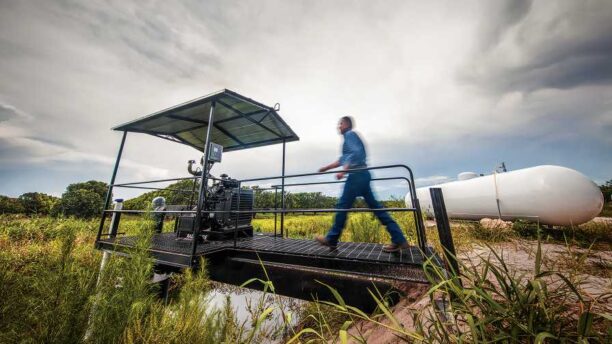Propane: A Smart Choice for Farmers This Growing Season
As farmers across America gear up for the peak of the growing season, the demand for efficient irrigation solutions is more pressing than ever. Propane-powered irrigation systems are emerging as a reliable and cost-effective choice to meet these demands while enhancing overall farm operations. Here’s how propane can help farmers maximize irrigation efficiency during this… Continue reading Propane: A Smart Choice for Farmers This Growing Season
As farmers across America gear up for the peak of the growing season, the demand for efficient irrigation solutions is more pressing than ever. Propane-powered irrigation systems are emerging as a reliable and cost-effective choice to meet these demands while enhancing overall farm operations. Here’s how propane can help farmers maximize irrigation efficiency during this critical time.
The Benefits of Propane-Powered Irrigation
Propane offers several advantages for agricultural irrigation that are particularly beneficial during the growing season. These advantages include:
Cost Efficiency: Propane is often more cost-effective than diesel or gasoline, providing significant savings on fuel expenses. Lower operational costs contribute to improved profitability for farmers.
Environmental Friendliness: Propane burns cleaner than traditional fuels, reducing greenhouse gas emissions and helping farmers meet sustainability goals. This environmental advantage is vital in today’s agricultural landscape.
Reliable Performance: Propane engines are known for their reliability and consistent performance, ensuring uninterrupted water supply to crops during critical growth stages.
Enhancing Irrigation Operations
Switching to propane-powered irrigation systems can yield substantial benefits for farmers such as:
Consistent Water Supply: Propane engines provide a steady power source, ensuring reliable water distribution even in remote or challenging agricultural environments.
Improved Fuel Storage: On-site propane storage tanks minimize downtime and reduce dependence on frequent fuel deliveries, an essential for maintaining continuous irrigation operations.
Versatile Applications: Propane engines support various irrigation methods, including pivot, drip, and linear systems, thereby catering to diverse farming needs and crop types.
Financial Incentives and Support
Farmers can take advantage of current financial incentives and support programs to facilitate the transition to propane-powered irrigation systems. These include:
Rebates and Grants: State and federal programs offer financial incentives for purchasing and installing propane equipment, making it more accessible for farmers looking to upgrade.
Tax Credits: Tax credits for using clean energy sources like propane further offset initial investment costs and contribute to long-term savings.
Training and Resources: Organizations like the Propane Education & Research Council (PERC) provide training and resources to optimize the use of propane-powered equipment, ensuring that farmers are able to maximize their investment.
Real-World Success Stories
Farmers nationwide have successfully integrated propane-powered irrigation systems into their operations with impressive results such as:
Increased Yields: Enhanced irrigation efficiency has led to higher crop yields, crucial for meeting growing demand and maximizing profitability.
Lower Operational Costs: Reduced fuel and maintenance expenses translate to improved financial stability, allowing farmers to reinvest in their operations and expand production.
Enhanced Sustainability: Propane’s cleaner burning properties align with sustainable farming practices, appealing to environmentally conscious consumers and enhancing market competitiveness.
Preparing for the Growing Season
As farmers prepare for the peak of the growing season, transitioning to propane-powered irrigation systems offers many strategic advantages. Farmers interested in this fuel choice would be wise to:
Evaluate Current Systems: Assess existing irrigation equipment and consider the benefits of upgrading to propane-powered solutions to optimize performance and efficiency.
Explore Financial Incentives: Research available rebates, grants, and tax credits to offset costs associated with purchasing and installing propane equipment. Consult local agricultural organizations or propane suppliers for guidance.
Plan for Installation: Partner with reputable equipment suppliers and installers to ensure seamless integration of propane-powered engines into existing irrigation systems. Proper planning and installation are essential for maximizing efficiency and minimizing downtime.
A Winning Choice
Propane-powered irrigation systems present a compelling opportunity for farmers to enhance irrigation efficiency, reduce costs, and support sustainable agricultural practices during this growing season. By leveraging the benefits of propane, farmers can optimize crop yields, improve profitability, and achieve long-term success in today’s competitive agricultural market. Embracing propane as a fuel solution underscores a commitment to innovation, efficiency, and environmental stewardship in the American farming industry.

